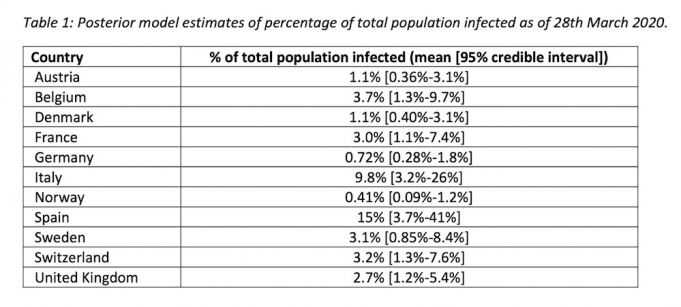Coronavirus report: 'Six million infected in Italy'
Italy's lockdown may have saved 38,000 lives according to experts at Imperial College London.
The drastic measures adopted in Europe to curb the spread of the Coronavirus pandemic may have already prevented up to 120,000 deaths in 11 countries across the continent, including 38,000 in Italy.
This is estimated in a 35-page report by a team of experts from Imperial College London, led by Neil Ferguson and Samir Bhatt, and released by the WHO Collaborating Center for Infectious Disease Modeling.
The new analysis by Imperial College researchers estimates the potential impact of interventions in 11 European countries - including Italy - in tackling the Coronavirus pandemic, such as social distancing, school closures and nationwide lockdowns.
"We find that the slowing growth in daily reported deaths in Italy is consistent with a significant impact of interventions implemented several weeks earlier", the report states.
The study suggests that between 7 and 43 million people may have been infected with the Coronavirus in 11 European countries by 28 March, representing between 1.8 and 11.4 per cent of the population.
- Italy: 1,109 people have recovered from Coronavirus
- Italy clarifies lockdown rules for parents and kids
The attack rate is estimated to be "highest in Spain followed by Italy and lowest in Germany and Norway, reflecting the relative stages of the epidemics", says the report, which estimates the percentage of people already infected with the Coronavirus in Italy at 9.8 per cent, in other words 5.9 million cases of Covid-19.
“This analysis shows that the interventions European countries have put in place have significantly slowed the spread of Covid-19,” said Professor Neil Ferguson, report author and director of the Jameel Institute for Disease and Emergency Analytics at the Imperial College.
“However, it is not yet clear whether or how quickly these measures will cause the numbers of new cases to decline. Data collected in the next two weeks will be crucial to refining our assessment of this key point,” Ferguson added.
“It is of course a difficult time for Europe, but governments have taken significant steps to ensure health systems do not get overwhelmed. There is sound evidence that these have started to work and have flattened the curve", said Dr Samir Bhatt, report author and senior lecturer from the School of Public Health at the Imperial College.
“We believe a large number of lives have been saved" - Bhatt said - "However, it is too soon to say if we have managed to fully control epidemics and more difficult decisions will need to be taken in the coming weeks.”
The full report by the Imperial College can be read here.
Photo: DIRE Agenzia di Stampa Nazionale


















